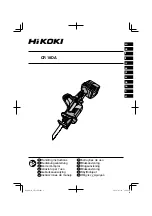
7
If you have any questions, call 1-800-54-HOW-TO.
E
NGLISH
• DON’T OVERREACH. Keep proper footing and balance
at all times.
• MAINTAIN TOOLS WITH CARE. Keep tools sharp and
clean for best and safest performance. Follow instructions
for lubricating and changing accessories.
• DISCONNECT TOOLS before servicing; when changing
accessories, such as blades, bits, cutters, and the like.
• REDUCE THE RISK OF UNINTENTIONAL STARTING.
Make sure switch is in OFF position before plugging in.
• USE RECOMMENDED ACCESSORIES. Consult the
instruction manual for recommended accessories. The
use of improper accessories may cause risk of injury to
persons.
• NEVER STAND ON TOOL. Serious injury could occur if
the tool is tipped or if the cutting tool is unintentionally
contacted.
• CHECK DAMAGED PARTS. Before further use of the
tool, a guard or other part that is damaged should be
carefully checked to determine that it will operate properly
and perform its intended function—check for alignment of
moving parts, binding of moving parts, breakage of parts,
mounting and any other conditions that may affect its
operation. A guard or other part that is damaged should
be properly repaired or replaced. Do not use tool if switch
does not turn it on and off.
• NEVER LEAVE TOOL RUNNING UNATTENDED. TURN
POWER OFF. Don’t leave tool until it comes to a
complete stop.
• D O N O T O P E R AT E E L E C T R I C T O O L S N E A R
F L A M M A B L E L I Q U I D S O R I N G A S E O U S O R
EXPLOSIVE ATMOSPHERES. Motors in these tools may
spark and ignite fumes.
• USE PROPER EXTENSION CORDS. Make sure your
extension cord is in good condition. When using an
extension cord, be sure to use one heavy enough to carry
the current your product will draw. An undersized cord will
cause a drop in line voltage resulting in loss of power and
overheating. The following table shows the correct size to
use depending on cord length and nameplate ampere
rating. If in doubt, use the next heavier gage. The smaller
the gage number, the heavier the cord.
Additional Safety Rules For Miter Saws
CAUTION: FAILURE TO HEED THESE WARNINGS
MAY RESULT IN PERSONAL INJURY AND SERIOUS
DAMAGE TO THE SAW.
• DO-Protect electric supply line with at least a 15 ampere
time-delay fuse or a circuit breaker.
• DO-Make certain the blade rotates in the correct direction
and that the teeth at the bottom of the blade are pointing
to the rear of the miter saw.
• DO-Be sure all clamp handles are tight before starting
any operation.
Minimum Gage for Cord Sets
Volts
Total Length of Cord in Feet
120V
25
26-50
51-100
101-150
240V
50
51-100
101-200
201-300
Ampere Rating
More
Not more
American Wire Gage
Than
Than
0
-
6
18
16
16
14
6
-
10
18
16
14
12
10
-
12
16
16
14
12
12
-
16
14
12
Not Recommended
154791 / 1720 miter saw 2/2/00 11:49 AM Page 7








































